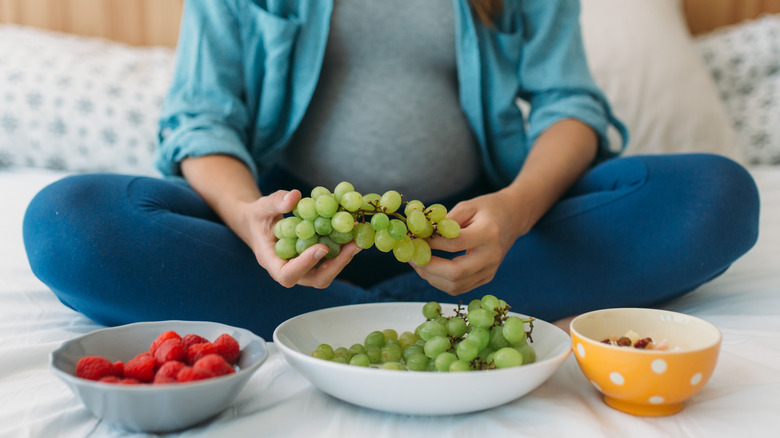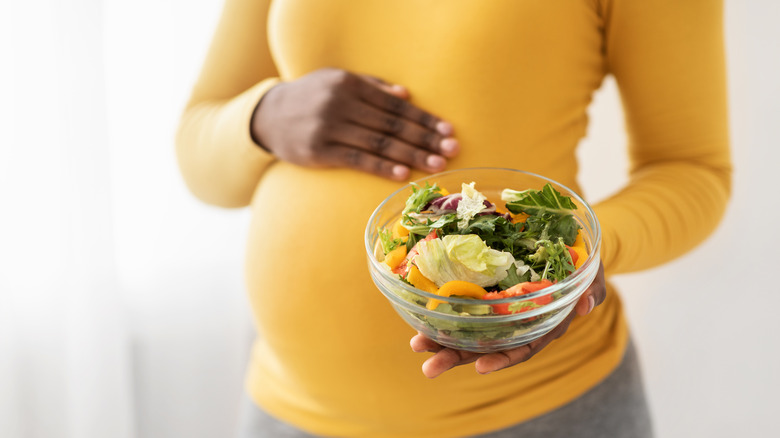What Pregnancy Does To Your Appetite
There's no denying pregnancy comes with many changes. While appetite changes throughout pregnancy are no exception and a very common occurrence, experts agree it's important for moms-to-be to maintain a healthy relationship with food.
If this sounds hard, fear not. There are many strategies that can help you get the right nutrients and calories despite food aversions or cravings, according to What to Expect. During this time, you'll be learning to listen to your body and adapt to the changes you and your baby are going through as you grow together. If you still find yourself wanting more guidance, your doctor may be able to tailor a dietary plan of action that supports your increasing caloric needs. Another option is to seek a dietitian who specializes in pregnancy nutrition. They can help you manage appetite changes as they occur while focusing on nutrient-dense meals as much as possible. There are even online tools to help you plan healthy meals (via the U.S. Department of Agriculture).
Keep in mind that a 340-450 calorie increase is normal, with a focus on foods high in key nutrients, such as calcium, folic acid, iron, and protein (via the American College of Obstetricians and Gynecologists).
Appetite loss during pregnancy
Appetite loss is a common occurrence in expecting moms due to food aversions that can kick in during the first trimester. Food aversions often express themselves as sickness at the thought or smell of foods. Up to 60% of women experience food aversions, according to BabyCenter. While more research is needed to determine the exact cause, it's thought that it can be attributed to hormonal changes and a heightened sense of smell. The most common aversions reported are alcohol, coffee, tea, meat, fatty food, spicy food, and eggs. Generally, foods that are bland and sweet are better tolerated for those with food aversions (via Pregnancy, Birth, and Baby).
While aversions and appetite loss are very common and generally pose little risk, you may not get enough calories or nutrition. Additionally, many women experience appetite loss due to morning sickness. Morning sickness is nausea or vomiting that can happen at any time of day, despite its name. While it's unknown exactly what causes morning sickness, some experts believe it's due to low blood sugar or a surge in pregnancy hormones. Stress, lack of rest, eating trigger foods or motion sensitivity can aggravate morning sickness and ultimately make you not want to eat (via the Cleveland Clinic). While morning sickness is generally not dangerous, it's important to be mindful of both food and water intake at this time to ensure you're getting proper nutrition and hydration.
Appetite increases while expecting
Appetite increases happen to many women, especially in the second trimester once morning sickness subsides and the baby continues growing. For reference, it's recommended that moms-to-be who started pregnancy at a normal weight gain about 1 pound per week starting in the second trimester. That equals about 20-24 pounds during the second and third trimesters, according to What to Expect. This weight gain may not be hard for women experiencing food cravings.
While the cravings of pregnant women are understudied, there are theories to explain why many experience them. These include factors such as hormonal changes, increased sense of smell, evolving nutritional needs, and the desire for comforting food. Even cultural messaging appears to play a role in pregnancy cravings. The most common cravings reported are sweet foods, calorie-dense, salty carbohydrates, animal proteins, and fruits, according to Verywell Family.
During this time, it's important to listen to your body and get the proper nutrition for you and your baby. Some helpful strategies include staying hydrated, being aware of caloric intake, avoiding stocking your kitchen with processed, calorie-dense foods, and eating small, frequent meals and snacks throughout the day. Indulging every now and then is a healthy part of a balanced diet.
Some women experience cravings for inedible, dangerous-to-consume items such as dirt, laundry detergent, ash, and clay. This is typically indicative of a medical condition during pregnancy called pica and should be addressed with your healthcare provider right away (via Verywell Family).



